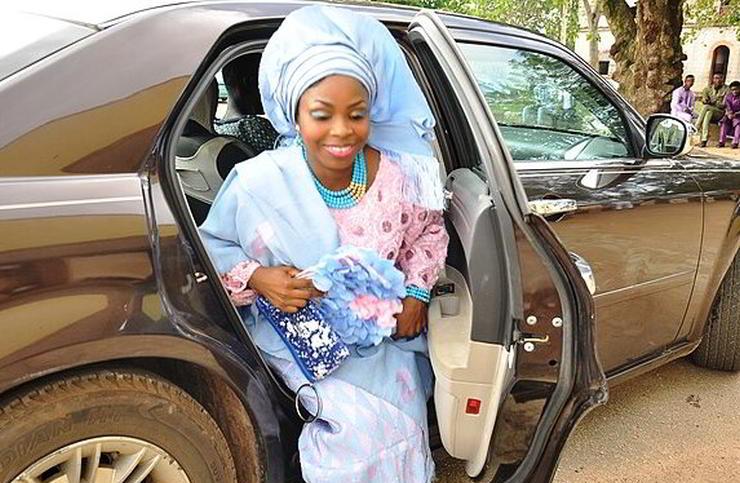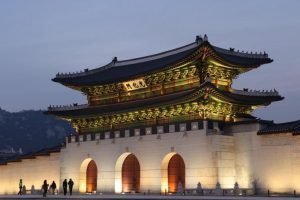In Lagos, engaged couples compete to organise the most sumptuous wedding. And they make the thriving wedding industry grow. Receptions for hundreds of guests, dresses studded with precious stones, arrivals at church aboard yachts or helicopters, showers of banknotes on the newlyweds. In Nigeria, weddings are always exaggerated and often have surreal implications.
Limousines and Cadillacs are no longer popular. Now it’s fashionable to land a helicopter on the church steps. Or disembark from a yacht at Elegushi Beach and celebrate the wedding ceremony among the palm trees, barefoot on the sand, with the sound of the waves in the background, without giving up the Swarovski-studded dress. Nigerians who get married compete to show off the most unbridled luxury. And the competition has become even more intense with the advent of the internet.
Today there are specialised blogs – like Nigeria Wedding or Bella Naija – that have millions of followers and that publish photos of the ceremonies on Instagram. The web audience comments, appreciates, criticises, and votes for the best wedding. Personal prestige is fought over with likes. Families dig deep into their savings to organise a sumptuous ceremony, they do everything they can to amaze, astonish, and leave guests speechless… At any cost.
“In Lagos, marriage always has a dual function: it seals a promise of love and publicly certifies the economic well-being of the spouses,” explains Grace Abisade of WedExpo, the most important Nigerian trade fair in the sector. The multimillion-dollar wedding industry knows no crisis and is thriving despite the collapse in oil prices that has brought the Nigerian economy to its knees. Abisade comments, “People are willing to make sacrifices in all areas – they save on daily expenses, hobbies and holidays – but for the big day they don’t want to give up the most unbridled pomp.”
To walk down the aisle, an engaged couple must budget a minimum of three million naira (about nine thousand euros), but often the amount needed to celebrate the wedding increases tenfold and can even reach 50 million naira.
The bill includes everything needed to make the day of special: flowers and decorations for the church, an offering for the pastor or priest, the rental of the home for the wedding reception, lunch for at least two hundred people, the clothes of the spouses and their closest family members, a photographer and cameraman for the drone shots, a singer for the musical accompaniment, fireworks and… gifts for the guests.
The wedding ceremony is an exaggerated event that involves a large number of qualified professionals: chefs, make-up artists, hairdressers, tailors, waiters, masters of ceremonies, set designers, decorators, musicians, bouncers, bomb disposal experts…
The great director of the event is the wedding planner, whose job it is to organize everything down to the smallest details “the most beautiful and important day in a person’s life”. It is up to him to take care of everything: from the invitations to the refreshments, from the decorations to the entertainment, from the choice of the dress to the wedding rings, up to the honeymoon.
“We personalise the party based on the tastes and budget of the bride and groom”, explains Ngozi Rume Otogbolu, one of the most highly rated wedding planners in Lagos, with a personal fee of one million naira (three thousand euros) per wedding. “Our job is to make even the most eccentric and incredible request possible”. Some want to exchange rings under a cascade of soap bubbles and those who are content to cut a two-meter-high cake. Some request the musical accompaniment of a famous rapper and those who want to have a movie star or a soccer star among the guests (all paid astronomical fees).
The tasks of the pre-nuptial phase – the presentation to the future in-laws and the agreement on the dowry that sanctions the engagement – are governed by the immovable customs of tradition, while the actual wedding ceremony (especially the Christian one) is inspired by modern Western customs, with some important peculiarities. The look of the bridesmaids in Nigeria is chosen by the mother of the bride (who is the only woman to dress in white).
Whether it is elegant suits or skirts as full as tulips, the most important thing is the colour of the clothes. Pastel tones are banned, the favourite colours are bright green, lapis lazuli blue, canary yellow, and cherry red: bright hues to be scrupulously matched with the flower bouquets and the drapes wrapped around the women’s heads.
The only sober shades at wedding receptions are those of the pinstriped suits worn by the groomsmen: white or black. The overall effect is an exaggerated rainbow, where there is no room for sobriety. To confirm this, just visit Lagos during the favourite wedding season, from April to December, when every day dozens of new marital unions are celebrated and the metropolis seems crowded with carnival-style parades.
There are no wedding lists. The gift must be presented, or rather, displayed, during the party. And those who lack the imagination to choose an appropriate gift to wrap and tie with ribbons can always present their gift when the highlight of the wedding ceremony arrives: the bride and groom’s dance. At that point something surreal happens. While the couple of dances together in the centre of the room, groups of guests approach and throw bundles of banknotes on their heads.
Guests are provided with one-hundred- or two-hundred-naira notes by the “wedding money changers” – also essential professionals at weddings in Lagos – who exchange thousand-naira notes for smaller notes (and keep a few pennies as a commission). A shower of paper money pours down on the bride and groom and flutters across the dance floor.
While the dancing and music continue, a couple of bridesmaids sweep up the money on the dance floor and put it in a purse. At the end of the day, it will be up to them to do the math and tell the newlyweds how much the gifts were. You will never get back what you spent, but the crazy Nigerian wedding is an investment you can’t give up. In Lagos, when it’s time to organise a wedding, there’s a saying: “Big or nothing.” (Omolade Ayodele/Africa) – (CC BY-SA 4.0/Titilayodeji13)









